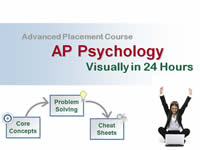So it was with that jaundiced perspective that I read a press release from the Rapid Learning Center, an organization I was unaware of until my AP Psychology Google News alert popped up in my inbox. The release highlighted RLC's "expansion into the behavioral sciences with the introduction of a new course for AP Psychology." What is this new course, you ask? Why it's the latest in their series of courses that promise that you can "teach yourself the entire course in 24 hours."
Yes, people, AP Psych in 24 hours. Here's what they offer for $199:
- 24 Rich-Media Tutorials (Chapter Movies)
Core concept tutorials with on-screen visualization and expert narration via our signature Rapid Learning System.
- 24 Problem-Solving Quizzes (Interactive Drills)
Feedback-based problems with a scoring system to track performance and complete solution to reivew concepts.
- 24 Super-Review Cheat Sheets (PDF Printables)
One cheat sheet per chapter and all key concepts in an at-a-glance single sheet, both printable and laminable, ideal for exam prep and quick review. - 24 Printable eBooks
One eBook per chapter, a print version of the tutorial video for easy-to-read - 24 MP3 AudioBooks
One AudioBook per chapter for learning-on-the-go on any MP3 player or smart phone.
The tutorial just seems very boring - a monotonous voice reading mediocre text alongside minimal graphics. I didn't view all of the slides, but the ones I did see were painful. Here are some of the things I learned from them:
- To make a mnemonic, write down a list of words, take the first letter and create a sentence. So "to remember the various subfields in psychology - Biological Developmental Cognitive Personality Social - [use the mnemonic] But Do Cats Play Soccer."
- "If you cram too much information and make yourself nervous the night before the exam, you might get into a 'mental indigestion.'"
- When taking the test, "apply techniques to eliminate incorrect answers."
--posted by Steve






2 comments:
Wow. Seems to fly in the face of the "spacing effect" (distributed practice) to attempt to learn an entire subject in 24 hours. Did the creators of this product even read their own material?
On a related note, I share the creeping frustration about the glib solutions offered for the educational challenges currently facing students/teachers/schools/communities. The ease with which outside observors blame educational professionals for the very problems we are striving daily to solve is rather offensive to me. Of course, perhaps fundamental attribution error (and actor-observor effect) may be at play in creating these simple, but perhaps misguided, explanations?
It is discouraging to see so many not Caring about education. Seeking to extinguish learner excitement for learning and about thier ability to learn, their potential and peak moments, when they discover capabilities, before not even imagined.
Post a Comment